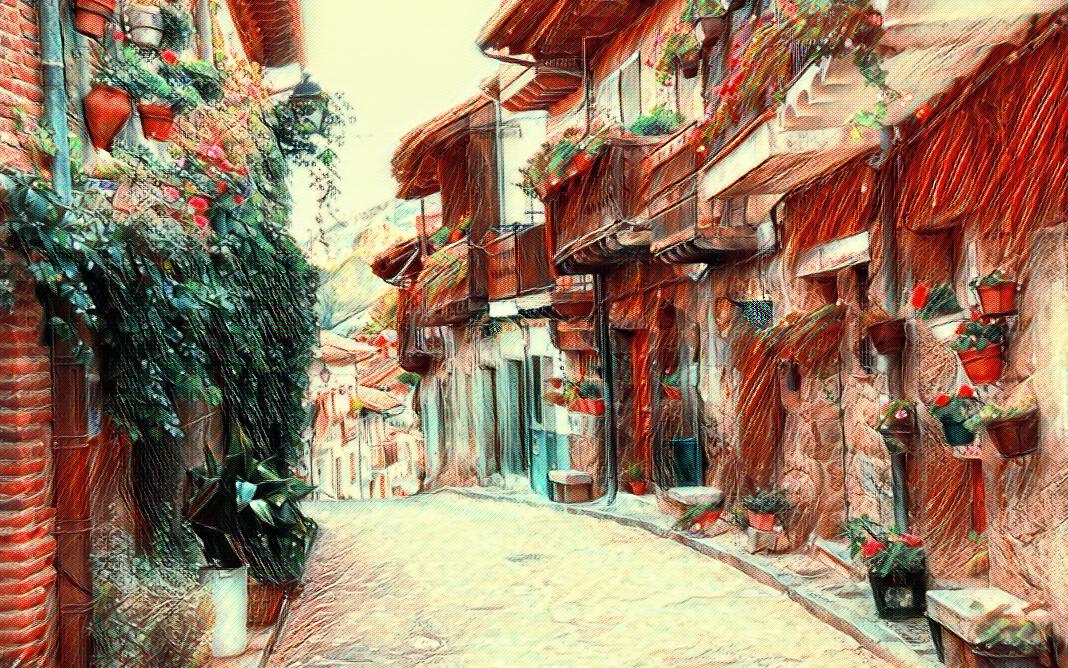Atrayee revisits the short story, Konkaal, by Rabindranath Tagore. She adapts it to contemporary settings, as a Special Feature on Tagore’s 159th birth anniversary. An exclusive for Different Truths.
 Arup held his glass and lurched towards the door. Cobblestoned streets, wooden townhouses with flower-filled window planter boxes, Gothic medieval architecture; the beauty around this small town of Rothenberg was a comfort for sore eyes. He came out and looked at the sky. Scattered with stars, the greyish blue canvas of darkness looked like a sheet studded with tiny glittering diamonds. Arup was sloshed. And, whenever alcohol invaded his senses, his true Bong traits came to the fore. He took another sip of his whiskey and addressed at that windswept setting.
Arup held his glass and lurched towards the door. Cobblestoned streets, wooden townhouses with flower-filled window planter boxes, Gothic medieval architecture; the beauty around this small town of Rothenberg was a comfort for sore eyes. He came out and looked at the sky. Scattered with stars, the greyish blue canvas of darkness looked like a sheet studded with tiny glittering diamonds. Arup was sloshed. And, whenever alcohol invaded his senses, his true Bong traits came to the fore. He took another sip of his whiskey and addressed at that windswept setting.
Arup held his glass and lurched towards the door. Cobblestoned streets, wooden townhouses with flower-filled window planter boxes, Gothic medieval architecture; the beauty around this small town of Rothenberg was a comfort for sore eyes. He came out and looked at the sky. Scattered with stars, the greyish blue canvas of darkness looked like a sheet studded with tiny glittering diamonds. Arup was sloshed.
“Where the mind is without fear and the head is held high…”
Moinak clasped Arup before he lost his balance and muttered the next line of the poem. “Where knowledge is free… We know that…Now stop Arup… Please.”
On a dime, from another end of the lane, another scream pierced the air. A womanly voice hurled disgust in German. Of course, for tampering with the peace in the middle of the night.
“Please come inside and recite, or sing or dance… Do whatever you wish to… But come inside.” Moinak requested and brought Arup inside and made him sit on a chair. He looked groggy. Half asleep and lost in his musings, he kept reciting the poem of Tagore, Where the mind is without fear.
It was 11 in the night. Moinak himself had been through a rough day with a series of Real-time PCR analysis in his laboratory. He was exhausted, both in the body and the brain. “Arup… I am done, dude… I’ll go to bed.” He finished his drink and waited for Arup to respond. Silence…
It was 11 in the night. Moinak himself had been through a rough day with a series of Real-time PCR analysis in his laboratory. He was exhausted, both in the body and the brain.
Where was Arup? Afloat somewhere, in a world of trance, eyes closed, slouching on his chair he was singing aloud one of Tagore’s song, Daariye acho tumi amaar gaaner opaare.
“Dude… You really need help.” Moinak muttered and went to his room, leaving Arup behind with his one-sided and never-ending love for Tagore.
A few years ago, Arup had come to Berlin on a student’s visa for pursuing his Masters. Degree obtained with good grades, he earned a place for himself in a biological research laboratory as a Research technician. His placement was in a branch location situated in Rothenberg. The offer was worthwhile for any middle class Indian who had an educational loan to repay. Arup accepted the offer gladly and moved in with Moinak. He was a senior colleague and sharing the apartment was conducive for both of them. One, for the company of common mother tongue of course, and another for saving a little extra. But, in quick time, homesickness set in.
Blind drunk, Arup couldn’t move out of his chair. Everything in the room; the old built-in cabinet, the study table, the piles of books in the corner, they all slowly faded into a blur.
Blind drunk, Arup couldn’t move out of his chair. Everything in the room; the old built-in cabinet, the study table, the piles of books in the corner, they all slowly faded into a blur. Arup could feel his eyes drooping and did not even realise when he slipped into a stupor.
A shrill creaking noise woke him up. Little dizzy in the head, Arup saw a woman, young in years, sitting before him. Was it a dream? He looked at the door. It was locked. Even the windows were shut. Then where did she come from? Arup folded his stretched out legs and adjusted further in his chair to maintain a decent mien before a woman.
He stared at the woman. It wasn’t a dream. A real human body, made up of flesh and blood sat there breathing in and out.
The woman spoke nothing but smiled. She looked beautiful. Fair, blonde hair artistically curled in the front making a bouffant, in turn suiting her angular jawline. Eyes were big and downturned with the slightest hint of being hooded and they guarded a thin sharp nose
The woman spoke nothing but smiled. She looked beautiful. Fair, blonde hair artistically curled in the front making a bouffant, in turn suiting her angular jawline. Eyes were big and downturned with the slightest hint of being hooded and they guarded a thin sharp nose which apparently looked quite long for a woman.
Arup blinked for a couple of times and uttered with a trembling voice. “Who are you?”
The woman didn’t speak but raised her eyebrows in doubt. Perhaps she couldn’t even hear Arup in his lame effort to voice out. He cleared his throat and asked again, this time in a more authoritative voice.
“Oh! Never mind me… I am just a friend.” The woman chortled and remained seated there looking at him; surely expecting to start off on a chain of conversation.
In the middle of the night, with a foreigner? What did she wish to talk? Arup was confused and busy drawing out several suspicious links.
In the middle of the night, with a foreigner? What did she wish to talk? Arup was confused and busy drawing out several suspicious links. And before his dread could brew any further, the woman got up from the chair and took a stroll.
“I used to live here.” She said and swiped on the dust that lay over the study table.
Arup gulped apprehensively, fearing her to be the owner of the house. She might have gotten complaints about that earlier incident. “Ah! We do clean the house… On weekends.” He justified.
The woman smiled at his prompt defense and took the liberty to open the cabinet. A slight furrow of displeasure creased his eyebrows. Arup was irked. The woman could be the owner.
The woman smiled at his prompt defense and took the liberty to open the cabinet. A slight furrow of displeasure creased his eyebrows. Arup was irked. The woman could be the owner. However, no owner had the right to intrude into a tenant’s privacy until there was a case of property damage.
A slight furrow of displeasure creased his eyebrows. Arup was irked. The woman could be the owner. However, no owner had the right to intrude into a tenant’s privacy until there was a case of property damage.
“That’s mine… Personal.” Arup fumbled. Words were still slurred and the tongue lolled about. The woman arched her eyebrows in surprise, closed the cabinet and walked straight back to her chair. Seeing Arup tongue-tied all over again, the woman initiated. “What is it that makes you so sad in my beautiful town?”
Oh! That was the weakest nerve she had pressed. None dared to ask him, for nobody was ever in accord with Arup’s wailing essay on how much he missed his Kolkata and its ever-blooming culture.
Berlin had been far more tolerable. All credit to the sizeable Bengali populace residing there who cobbled together an association of sorts. On the other hand, Rothenberg had nothing much happening.
Berlin had been far more tolerable. All credit to the sizeable Bengali populace residing there who cobbled together an association of sorts. On the other hand, Rothenberg had nothing much happening. At all… Very few Indians in the first place, that too mainly from the southern part; they all executed their jobs like robots, collecting all the Euros they could. And now, in the darkness of the night, when someone showed concern to Arup’s tragic state of emotions, he didn’t mind opening up.
It was ‘Pocheeshe Boishaakh’ as per the Bengali calendar. Thus, in this far away land, with none to celebrate Tagore’s birth anniversary, no one reciting a poem or humming a song or doing anything to pay tribute to the great polymath, inflamed his already sunken soul. Last month’s Bengali New Year celebration too had turned futile; Arup’s failed tryst at making rosogollas playing a part. And today, Tagore’s birthday also sped past without anything special marking it.
Actually, Moinak was not of Arup’s ilk. Kolkata remained a mere place for him, and never an emotion. Bengali lingered nothing more than being his mother tongue. He was so close to his scientific career that his land’s culture and tradition was more like poppycock.
Actually, Moinak was not of Arup’s ilk. Kolkata remained a mere place for him, and never an emotion. Bengali lingered nothing more than being his mother tongue. He was so close to his scientific career that his land’s culture and tradition was more like poppycock. Nothing of what tickled Arup made sense to Moinak. On the contrary, as the woman could perceive, Arup had a better appetite for literature. Much more pronounced than his fondness towards science.
Arup retched out all the turmoil he had been squirrelling within. The woman, apparently an uninvited guest of the night, seemed to be a patient and curious listener. Arup chose to recite a few of Tagore’s poems. He even took the pain of translating them. The night flew by with Arup construing a clearer picture of Tagore to his guest; with his stories, his mellifluous songs. And very soon, an urge transpired. Should he not let the woman narrate her musings as well?
Given the chance, the young woman was thrilled to share her story.
She was named Batya. It meant the Daughter of God in Hebrew. She was born and brought up in Rothenberg and this was her house. She liked visiting her old house amidst the dense darkness when no human was around to catch sight of her.
She was named Batya. It meant the Daughter of God in Hebrew. She was born and brought up in Rothenberg and this was her house. She liked visiting her old house amidst the dense darkness when no human was around to catch sight of her. Arup was quite strained after his hour-long monologue and preferred not to interrupt his guest.
Batya had a big family with four other siblings. She was nineteen when Leibel, her eldest brother brought in an injured man in their house. His name was Alger, a military man, judging by the uniform he was wearing. He was wounded by some wild animal and lay bleeding in the side of the road with none to help. Leibel was a medicine graduate and chose to administer basic first aid to Alger.
Tall and handsome with green eyes, Alger stole young Batya’s heart with the very first glance. She took out time from her household chores to help Leibel in curing Alger. Cupid’s arrow struck the right spot. However, the prevailing situation in Germany was not very easy to stomach. Alger knew it very well. Marrying a Jew would cause more wounds than joy. Still, he played along till the time he stayed with them.
Tall and handsome with green eyes, Alger stole young Batya’s heart with the very first glance. She took out time from her household chores to help Leibel in curing Alger. Cupid’s arrow struck the right spot.
In a month’s time, the Fuhrer declared a crusade against the Jews and the small beautiful town of Rothenberg was mutilated brutally. To further rub in the irony, Batya espied Alger amongst the Nazi Army, jackboots raised and rhythmically marching to wipe out the Jews in her town. Alger was appalled with the chain of orders he carried along and hence couldn’t look into Batya’s eyes. She screamed, she cried, she cursed. A future so bleak, so barbaric kept mocking her from nowhere. She realised she could never marry Alger. Ever… Yet, she wished to meet him once. For one last time.
Arup was wide awake, brooding over every word uttered by Batya. A miasma of emotions flooded his mind. It was a tale of love. A love that nurtured a hope of forever togetherness. However, it was smashed ruthlessly by a norm, dictated by someone who had the authority over each life which resided in this land.
“Then?” Arup uttered.
Batya got up from her chair and again went near the cabinet. “You see this… That night, when nothing was left in this town to feel humane, I waited for Alger in this house… Hiding inside this very cabinet, lest any of those gunmen should find me.”
With a leg constantly shaking, Arup was quite impatient to know if Alger had indeed come that night to meet Batya.
With a leg constantly shaking, Arup was quite impatient to know if Alger had indeed come that night to meet Batya.
Yes. Alger did come; all alone, escaping those watchful guards, cloaking his ID behind a disguise. And he came with a proposal. He had chalked out a plan to rescue Batya from this sprouting terror, yet no mention of marriage at all. Alger was scared for his own life. He couldn’t risk it all for a Jew, an entire race which was terrorised at the gunpoint by the Fuhrer. Batya understood. She never pleaded for anyone’s sympathy. All she desired was a fulfilment of her love. If not in this world, maybe in another.
Batya paused. Tears welled in her eyes as she spoke again. “That night…I poisoned the water he carried… Alger died on his way back. I too drank the poison… With the hope of meeting my Alger in that other world where no Fuhrer could rule our love… Our fate.”
Arup was numb. He could neither speak nor move out of his chair. Batya was dead? Yes indeed. She was a dead woman walking. She spoke about the Nazis; that Fuhrer was none other than Adolf Hitler himself.
Arup was numb. He could neither speak nor move out of his chair. Batya was dead? Yes indeed. She was a dead woman walking. She spoke about the Nazis; that Fuhrer was none other than Adolf Hitler himself. He was the one who set the inhumane norms against the Jews. The pogrom of the Jews happened during WW II. Arup shuddered in fear, not knowing how to react. His guest for the night was not someone from the neighbourhood, rather from a different world and a different time zone altogether.
Even at 13°C, as shown on his mobile screen, Arup felt the hot beads of sweat dripping down his spine. Batya stood still fondling that cabinet. Her voice, drenched in sorrow, continued. “I thought, beyond death Alger and I will be together forever… However, death seemed to be so empty. Nothing came along. Neither this body nor the beauty… I was just left with a skeleton buried under the ground along with many others. I could never find my Alger.”
Arup’s palm was freezing cold. He heard his heart throbbing in the ears. The whole process of inhaling and exhaling had become so loud and audible. He couldn’t bear them. Neither did he wish to hear more from this spectral woman.
Arup’s palm was freezing cold. He heard his heart throbbing in the ears. The whole process of inhaling and exhaling had become so loud and audible. He couldn’t bear them. Neither did he wish to hear more from this spectral woman. Batya; his guest after dark. He shut his ears tight with his palm and screamed in fear. “Stop… Stop…Please stop.”
Batya went to the door and looked back at Arup.
“You know Arup… I took death as a quick fix…It never was. It is never.” Batya paused and opened the door. An eerie gush of wind swept in and she seemed to dissipate in that leaving no traces behind. Except for an unearthly whisper, that swathed the cabinet. “Always wondered if life had more to offer…May be Alger.”
***
Arup…Arup… Arup.
Someone was calling Arup. A very feeble voice at first slowly made its way to the audible zone. Arup fluttered his eyes. A blurry image of Moinak was hanging over his face trying to wake him up. Arup got up with a jolt.
Someone was calling Arup. A very feeble voice at first slowly made its way to the audible zone. Arup fluttered his eyes. A blurry image of Moinak was hanging over his face trying to wake him up. Arup got up with a jolt. His eyes fell on the built-in cabinet and like a manic, he ran and opened it. He shuffled everything inside as if searching for something lost, something very precious.
Moinak, on the other hand, stood still, with a hung jaw; perhaps his roommate had really lost it.
A book lay open on the table. Pages fluttered with the gushing wind and stopped abruptly. There was a bookmark peeping out from the first page of a short story… Konkaal by Rabindranath Tagore.
Photo from the Internet





 By
By
 By
By
 By
By
 By
By
I’ve never read Tagore’s stories. But what you wrote is of course beautiful. “Death is empty…. Whatta line
This concept I like very much… Morphing the old ones into present days…. And I must say you have an affinity towards Hitler
Wonderful… true… nobody wants sympathy but love
The plot twist was amazing! I look forward to your writing.
Goosebumps!
Had goosebumps! What a Beautiful story..
Amazing… Truly admirable….
Lovely read. Blessings!